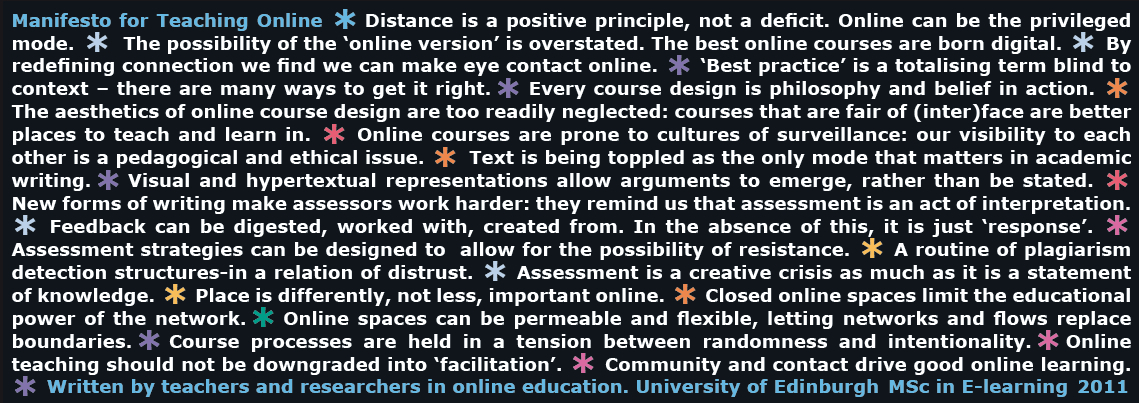
I stumbled across this article brought to my attention by a few different people from my network and I wanted to briefly mention my take on the issue. The article has Professor Mary Beard of Cambridge warning of the dangers of MOOCs as a means of subverting the teacher/student dynamic in favor of tutors or automated grading mechanisms. I am going to err on the side of caution in my response here as I have the distinct impression that some of the problem I had with this article was the editorial/journalistic framing of it rather than Professor Beard’s actual logic.
First and foremost, as endless people have or no doubt will point out, is the conflation of MOOCs with all of distance learning. Notice the nuance in the following (from the journalist, not Professor Beard):
Online courses – referred to as Moocs or Massive Open Online Courses – have increased in recent months as people take advantage of free distance learning.
No, online courses are not referred to as MOOCs. Those are massive open online courses. Online courses are merely those offered online. And they are not all free. Online learning is a larger category; MOOCs are one variant of that. For example, I learned from this article (as an example of an artifact in a larger learning environment) to be skeptical of the Daily Telegraph, but I wouldn’t refer to the Daily Telegraph as a MOOC. Fairly poor journalism there. But more importantly is the idea presented here that the teacher/student dynamic is not possible online.
“Education is about eyeball to eyeball contact and interaction, it’s not about having an essay on Hamlet marked by multiple choice online.” Professor Mary Beard, Cambridge
I need to unpack that assertion as it is two different points in one. First is the notion that “eyeball to eyeball” contact is the preferred or ideal or privileged learning dynamic. Professor Beard (assuming this isn’t an editorial error of some sort) is attempting to conflate the physical classroom (brick and mortar) and the teaching dynamic that exists therein as the preferred/ideal/correct, implying that eyeball to eyeball contact (oh so common in my undergraduate lecture halls of 300+ students) foregoes the possibility of meaningful online learning. Nonsense, and the research (into the effectiveness, affordances, and learning outcomes of digital education) should have made that apparent.
Just in case you thought that was a misprint:
The University of Cambridge professor said there was a danger of distinguishing between the ‘privileged few’ who get to meet and discuss lessons with their tutors and people who only get to see a ‘star tutor’ on the internet and are denied any genuine interaction which is likely to help them learn.
I am not sure if this Professor Beard or the journalist speaking here, but it is wrong either way. “Genuine interaction” is ambiguously presented here as impossible to find online or hard to come by. Perhaps in a MOOC it is (which is why, if done properly, they should be heavily designed/engineered towards peer learning structures), but MOOCS aren’t the whole online learning story, are they? And I will avoid discussing notions of the “privileged few” and Cambridge altogether as that is a sociocultural exploration of the greatest magnitude. I don’t have the time or the brain capacity to disentangle the way that education, class structure, and perception are intertwined.
The second is the assertion that online education will result in automated grading/scoring/disassociation with a human teaching element. This may be the case with some xMOOCs (once again, nuance and differentiation would have made the points much more palatable) or with some universities or colleges looking to cut costs or what have you. And we can call these exactly what they are: bad to mediocre programs or organizations. There is a lot of room for incorporating learning analytics (as opposed to automated assessments or instructional practices) in course design, but as a means to developing qualified learners. If your assessment mechanisms can be mass graded, then I doubt depth of learning was your main learning objective in the first place.
I have a bias here as I work with these colleagues quite a bit at the University of Edinburgh (MSc in Digital Education), but they are always the example/evidence I point to when I am forced to return to this discussion on whether or not online learning is effective. And I return to the Manifesto for Teaching Online as a representation of all that research, pedagogy, experience, and enthusiasm for distance education, the essence of it.
“By redefining connection we find we can make eye contact online…Distance is a positive principle, not a deficit. Online can be the privileged mode”
Connections are different online, but that doesn’t privilege the “eyeball to eyeball” dynamic that Professor Beard is holding up as the ideal. I use this manifesto to inform my course design, my teaching practice (face to face and online), my professional development, and my networked interactions. I feel compelled to respond when I see these articles from those within higher education who should be aware of the developments in the teaching profession. By all means critique MOOCs, particularly xMOOCs and their pedagogical throwback to the 1990s approach, but lets not throw out the baby with the bathwater, eh?


[…] "I stumbled across this article brought to my attention by a few different people from my network and I wanted to briefly mention my take on the issue. The article has Professor Mary Beard of Cambridge warning of the dangers of MOOCs as a means of subverting the teacher/student dynamic in favor of tutors or automated grading mechanisms. I am going to err on the side of caution in my response here as I have the distinct impression that some of the problem I had with this article was the editorial/journalistic framing of it rather than Professor Beard’s actual logic." […]
[…] I stumbled across this article brought to my attention … […]
Great analysis, good feedback.